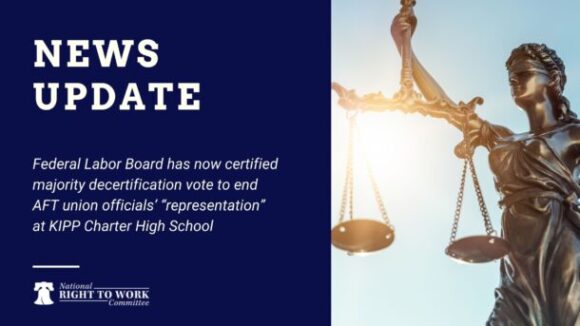Will Team Biden Weaponize Workers’ Pensions?
Big Labor abuse of worker pension and benefit funds as a means of advancing union bosses’ self-aggrandizing policy objectives is a familiar phenomenon.
On Monday, U.S. Bankruptcy Judge Christopher Klein cleared the way for Stockton, Calif., to file for bankruptcy, as the city of nearly 300,000 has been seeking to do for nine months. As of last summer, after trying for three years to cut costs and get its fiscal house in order, Stockton was still “by any measure insolvent” and “unable to pay debts as they came due,” Klein found.
Stockton’s creditors had sought to prevent the filing on the grounds that Stockton had, effectively and improperly, taken its pension debt off the table. A number of critics of monopolistic government unionism like Steven Greenhut of the Franklin Center agreed, arguing before Klein’s ruling that a decision allowing the bankruptcy to go ahead now would send a terrible message: “No matter what problems befall a city, public services and taxpayers suffer first while union members and public retirement systems are protected.”
An editorial appearing yesterday in the Santa Rosa, Calif.-based Press Democrat (see the link below) points out that, while Klein ruled against Stockton’s creditors, he certainly acknowledged that government pension and other compensation costs (which union officials have succeeded in foisting on the city largely because of the monopoly-bargaining privileges they wield under state law) are major factors in Stockton’s fiscal demise.
Moreover, Klein made it clear he may ultimately choose to require CalPERS, the Big Labor-dominated Golden State government agency that manages pension benefits for public employees and their families, to share the financial pain of Stockton’s bankruptcy along with creditors, taxpayers, and people who rely on public services.
The Press Democrat argues persuasively that overseeing a bankruptcy settlement slashing Stockton’s contributions to CalPERS is the fair and reasonable thing for Klein to do:
In his analysis on Monday, Klein noted that overly generous benefits and a “multi-decade, largely invisible pattern of above-market compensation for public employees” hastened Stockton’s collapse.
But he chastised creditors for refusing to work with the city in addressing its debt burden until and unless the city reduced its CalPERS commitments.
Don’t be fooled. Up to this point, CalPERS has represented itself as a supporter and advocate of Stockton and its bankruptcy filing. And why shouldn’t it, as long as it’s assured that the city, which in 2009 had had accumulated nearly $1 billion in debt thanks to ill-timed civic improvements, money owed to pay pension contributions and extremely generous health benefits, never misses a CalPERS payment?
The reality is CalPERS, with its assurances as far back as 1999 that enhanced retirement benefits for public employees would not result in an undue burden on cities, is as much responsible for Stockton’s downfall as anyone. And as a result, it should not be allowed to escape the Stockton debacle unscathed. This is especially true give that the city’s payments to CalPERS are expected to nearly double in the next 10 years. An outcome that allows that to go unchanged would be no less bankrupt.
PD Editorial: The elephant in bankruptcy case — pensions

Big Labor abuse of worker pension and benefit funds as a means of advancing union bosses’ self-aggrandizing policy objectives is a familiar phenomenon.

What impact does handing a union monopoly power to deal with your employer on matters concerning your pay, benefits, and work rules have on your pay?

Federal Labor Board has now certified majority decertification vote to end AFT union officials’ “representation” at KIPP Charter High School